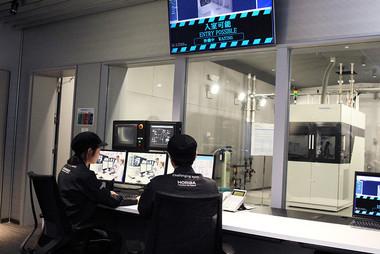HORIBA, Ltd. (Head Office: Kyoto, Japan; hereinafter, “HORIBA”) announced today that it has established CELL 0(zero), a new testing laboratory for evaluating and analyzing electrified vehicle batteries and fuel cells at HORIBA BIWAKO E-HARBOR (Shiga, Japan; hereinafter, “E-HARBOR”), an R&D and production site for its Automotive Test Systems and its Process and Environmental Instruments & Systems.
The CELL 0 laboratory incorporates battery and fuel-cell evaluation equipment from HORIBA FuelCon GmbH, which joined the HORIBA Group in September 2018, and will be used to evaluate the power-generation characteristics of fuel cells and conduct charge-discharge cycle testing of batteries under a broad range of temperature environments. The laboratory is also designed for R&D on battery management systems, thermal management, and durability evaluation. Establishing the laboratory within E-LAB, a development testing facility for automobiles at HORIBA BIWAKO E-HARBOR, enables us to conduct testing that combines batteries and fuel cells with powertrains*1 (including engines , motors, and drivelines) and vehicles installed in the neighboring laboratories.
HORIBA’s objectives in establishing the Fuel Cell and Battery Test Lab ‘CELL 0’
In order to accelerate contributions to the development of innovative mobility, HORIBA acquired U.K.-based vehicle engineering consultancy MIRA Limited (now HORIBA MIRA Limited) in 2015. In addition to HORIBA MIRA’s battery control technology and engineering capabilities, HORIBA has equipped its E-LAB with products from FuelCon AG, a German-based company that develops, manufactures, and sells evaluation systems for battery and fuel cell systems. HORIBA acquired FuelCon AG (now HORIBA FuelCon GmbH) in September 2018. This will complement HORIBA’s years of experience in analysis and measurement technology for developing internal combustion engine vehicles with the ability to provide total solutions that cover the development of a broad range of key components for electrified vehicles, including batteries, powertrains, and motors.
The HORIBA Group’s technology also contributes to the development of materials for mobility, such as the condition and surface analysis of material particles used in batteries and fuel cells. HORIBA aims to provide comprehensive analysis and measuring applications that cover everything from raw material analysis at the nanolevel to system evaluation that can be applied not only to the field of mobility (such as electrified vehicles), but also to the field of energy, where batteries and fuel cells play major roles in the process from primary energy to final energy consumption.
Key functions
- Capable of evaluating combinations of electrified vehicle batteries and fuel cells with powertrains and vehicles
- Realizes a broad range of environmental testing of various conditions, including temperature and humidity, using an environmental test chamber, as well as vibration
- Also serves as a showroom for HORIBA’s total solutions
About the facility
| Name | CELL 0 (zero) |
| Location | 1-15-1, Noka, Otsu, Shiga, 520-0102, Japan E-LAB Development Testing Facility for Automobiles at HORIBA BIWAKO E-HARBOR |
| Building area | Total floor area of approx. 330 m2 |
| Main equipment | Evaluation systems for fuel cell systems Battery charge-discharge system Environmental test chamber Battery temperature control unit HiLS/SiLS*2 |
| Total construction cost | Approx. 1.3 billion yen |
*1 System for transferring power to the driving wheels
*2 Automotive system development simulation
